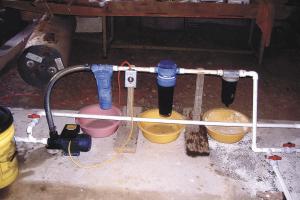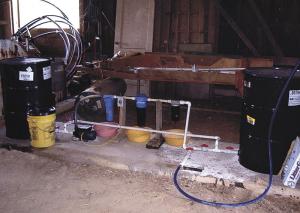2008 - Volume #32, Issue #4, Page #03
[ Sample Stories From This Issue | List of All Stories In This Issue | Print this story
| Read this issue]
Simple System Turns Waste Oil Into Diesel Fuel
 |
 |
"Basically I just clean up used oil and add diesel fuel to it. It makes a very cheap fuel and I haven't had any problems," says Rosenboom, who set the system up in his garage. "My total cost was less than $1,000."
The system consists of a 300-gal. bulk tank and two 55-gal. barrels spaced about 15 ft. apart. A 12-volt pump with a filter and valve system are positioned between them. There are three filters in line. The last filter is fitted with a magnet specially designed for engine oil. It picks up particles down to 1 1/2 microns in size. Waste oil is delivered to Rosenboom's farm and stored in the 300-gal. tank, where any water and solid particles settle to the bottom.
The first step is to pour a 5-gal. can of diesel fuel into the mixing barrel. To make a 3:1 mix he then pumps in 15 gal. of waste oil. Using a 3-ft. long paint mixer attached to a portable drill, he mixes the oil and diesel for about three minutes. Then he puts the lid back on the barrel, opens a pair of valves, and turns on the 12-volt pump to send the mixture through the filters and into the 55-gal. "fill" barrel.
After shutting off both valves to the barrels and opening up two other valves, he turns on the pump again to reverse the flow and filter the mixture a second time. A hose and nozzle at the fill barrel is used to fuel up vehicles or to pump the final mixture out to a storage barrel.
"If you had told me six months ago that this idea would work, I'd have said you were smoking funny cigarettes," says Rosenboom.
"I have a guy deliver the waste oil to me at a price of $1 per gallon. He has his own business picking up waste oil. It eliminates the need to run around to a lot of service stations myself. I let the raw oil sit for one or two weeks so the water and solid particles settle out to the bottom before I mix it with diesel fuel."
He says he came up with the idea two years ago. "I thought about pressing my own soybeans, but I'm a cow-calf operator with 100 cows so I don't have the time to process oil. I'm not adding any chemicals or cleaning solutions to the diesel fuel so I haven't seen any buildup of gunk on the fuel injectors. The stored fuel doesn't appear to separate at all. It looks thin and dark instead of gummy like pure oil."
Rosenboom has four tractors that he operates on a 4:1 mix of waste oil to diesel fuel, and he says they all run good. "By trial and error I've learned that if there's too much oil the engine will smoke a lot. Also, one of my tractors is an early 1960's model and the oil-diesel fuel makes it a little hard to start.
"I use a 2:1 mix in my 1999 Dodge 4-WD pickup equipped with a Cummins diesel engine, and it loves it. It starts quicker, and idle engine rpm's increased from 850 to 900 with no other modifications to the engine. I don't know why the engine rpm's go up - maybe because the cleaned-up oil frees up engine parts."
The economics are definitely favorable, says Rosenboom. As an example, he points to the 50 gallons of fuel he recently made at a 4:1 ratio. "I used 10 gallons of farm diesel at a cost of $4.34 per gallon, for a total diesel cost of $43.40. I used 40 gallons of used oil for a total oil cost of $40. So my total cost was $83.40, which comes out to $1.69 per gallon. That's a savings of $133.60," says Rosenboom.
A custom baler friend of his, who makes 10,000 round bales a year, recently set up his own system after looking at Rosenboom's. "He has three tractors for operating a mower, rake, and baler and uses 7,500 gallons of diesel fuel per year. Sometimes he goes through 75 gallons per day to keep all the tractors going. He gets his waste oil for nothing and doesn't even measure it. He just dumps it into a filter system that he set up on each of his tractors. Each filter has a magnet. Sometimes he barely gets any diesel fuel in the mix so he's running the tractor almost on straight waste oil. I don't recommend that because it might cause problems, especially in cold weather."
He paid $179 for the 12-volt pump. "I used a small pump because I didn't want to build up too much pressure and bypass the filters. The pump has a capacity of 330 gallons per hour or 5 1/2 gallons per minute. You could make a less expensive system using a $20 barrel pump.
"If you want to try this idea without spending a lot of money, go buy five gallons of diesel fuel and mix it with 10 gallons of new oil, then dump it in your diesel-powered car or pickup. That'll prove to you this idea really works."
Rosenboom says if there's enough interest he's willing to supply a detailed parts list and plumbing diagram for sale.
Contact: FARM SHOW Followup, Gerry Rosenboom, 5515 Hwy. 8 West, Mena, Ark. 71953 (ph 479 394-5817; glr@arkansas.net).

Click here to download page story appeared in.

Click here to read entire issue
To read the rest of this story, download this issue below or click here to register with your account number.




